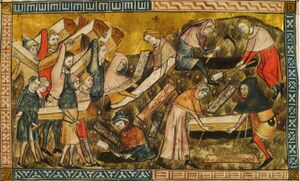Many thanks to our Patrons who cover ~2/3 of our hosting bill. Please join them if you can.
1348
Jump to navigation
Jump to search
1338 < 1339 < 1340 < 1341 < 1342 < 1343 < 1344 <1345 < 1346 < 1347 < 1348 > 1349 > 1350 > 1351 > 1352 > 1353 > 1354 > 1355 > 1356 > 1357 > 1358
 The people of Tournai bury victims of the Black Death. | |
| Year 1348 |
Year 1348 was a leap year starting on Tuesday.
Contents
Events
January–December
- January – Gonville Hall, the forerunner of Gonville and Caius College, Cambridge, England, is founded.
- January 25 – The 6.9-magnitude 1348 Friuli earthquake centered in Northern Italy was felt across Europe. Contemporary minds linked the quake with the Black Death, fueling fears that the Biblical Apocalypse had arrived.
- February 2 – Battle of Strėva: the Teutonic Order secure a victory over the Grand Duchy of Lithuania.
- April 7 – Charles University in Prague, founded the previous year by papal bull, is granted privileges by Charles I, King of Bohemia, in a golden bull.
- April 23 – Edward III of England creates the first English order of chivalry, the Most Noble Order of the Garter.
- By June 24 – The Black Death pandemic has reached England,[1] having probably been brought across the English Channel by fleas on rats aboard a ship from Gascony to the south coast port of Melcombe (modern-day Weymouth, Dorset);[2][3] by November it will have reached London and by 1350 will have killed one third to a half of its population.
- July 6 – A papal bull is issued by Pope Clement VI, protecting Jews against popular aggression during the Black Death pandemic.
- November 1 – The anti-royalist Union of Valencia attacks the Jews of Murviedro because they are serfs of the King of Valencia and thus "royalists".
- November 18 – Emperor Kōmyō of Japan abdicates the throne in favour of his son Emperor Sukō, making them the second and third of the Northern Court (Ashikaga Pretenders).
Date unknown
- The Black Death pandemic spreads to central and western Europe and to Cairo.
- Stefan the Mighty, Emperor of Serbia, conquers Thessaly and Epirus.
- The Pskov Republic gains independence from the Novgorod Republic with the treaty of Bolotovo.
- Hundred Years' War (1337–1360): The effects of the Black Death cause a de facto truce to be observed between England and France until 1355.
- Estimation: Hangzhou in Mongolian China becomes the largest city of the world, taking the lead from Cairo, capital of Mamluk Egypt.[4]
Births
- April 11 – Andronikos IV Palaiologos, Byzantine Emperor (d. 1385)
- date unknown
- John Fitzalan, 1st Lord Arundel (d. 1379)
- Alice Perrers, politically active English royal mistress and courtier (d. 1400)
Deaths
- February 2 – Narimantas, Christian Lithuanian prince of Pinsk (Battle of Strėva)
- June 9 – Ambrogio Lorenzetti, Sienese painter (Black Death) (b. 1290)
- June 13 – Don Juan Manuel, prince of Villena, Spanish writer (b. 1282)
- July 1 – Joan of England, princess (Black Death) (b. 1333/34)
- August 20 – Laurence Hastings, 1st Earl of Pembroke, English noble (b. 1319)
- August 23 – John de Stratford, Archbishop of Canterbury (b. c.1275)
- October 2 – Alice de Lacy, 4th Countess of Lincoln, English noblewoman (b. 1281)
- date unknown
- Laura de Noves, French countess, presumed beloved of Petrarch (b. 1310)
- Pietro Lorenzetti, Sienese painter (Black Death) (b. 1280)
- Umur of Aydın, Emir (killed in action) (b. c.1309)
- Giovanni Villani, chronicler of Florence (Black Death) (b. c. 1276)
A New Group
| Group | Image | Type | Description |
|---|---|---|---|
| Charles University |  | Public | One of the top universities in Eastern Europe |
Many thanks to our Patrons who cover ~2/3 of our hosting bill. Please join them if you can.